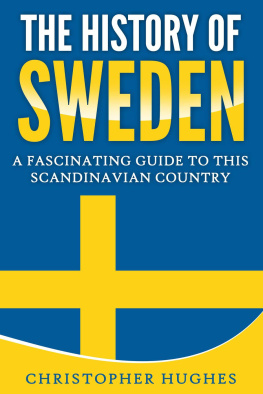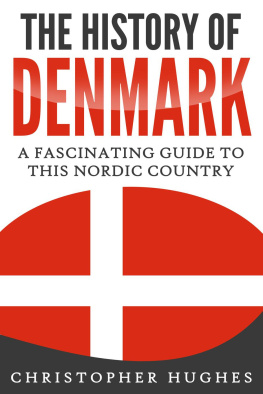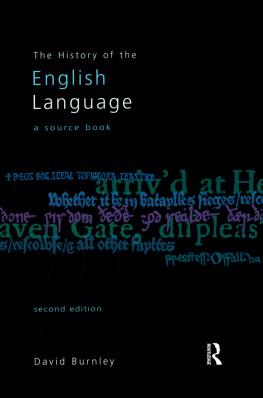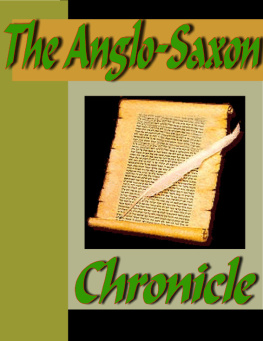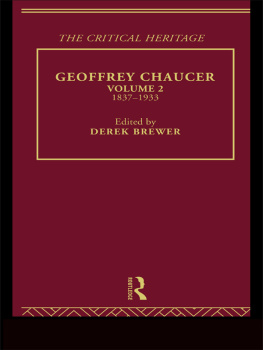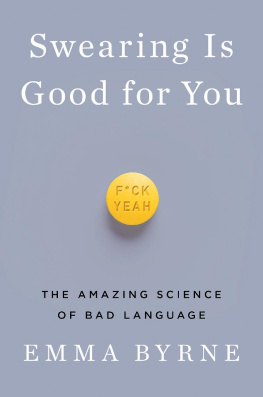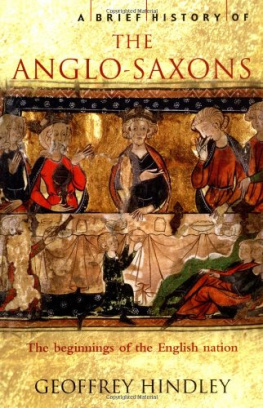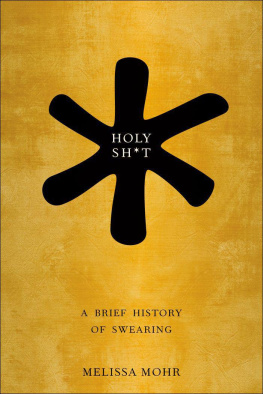PENGUIN BOOKS
SWEARING
Geoffrey Hughes was born in 1939 and grew up in England, East Africa and the Middle East. Since reading English at Oxford he has lectured at the University of Cape Town, been an Honorary Research Associate at Harvard, a visiting Professor at the University of Turin and is Ad Hominem Professor of the History of the English Language at the University of Witwatersrand (Johannesburg), a position he has held for ten years.
In addition to teaching a wide range of literature his special research interests are historical semantics and socio-linguistics, on which he has given papers at several international conferences. He has published over twenty articles and two previous books, Words in Time: A Social History of the English Vocabulary (1988) and Watchwords (1995), a collection of columns on topical words. He is the Collins Dictionaries Consultant for South African English and Editor of the journal English Studies in Africa. He is married, lives in Johannesburg, and is currently working on a lexical history of English.
SWEARING
A Social History of Foul Language, Oaths and Profanity in English

GeoffreyHughes

PENGUIN BOOKS
PENGUIN BOOKS
Published by the Penguin Group
Penguin Books Ltd, 80 Strand, London WC2R 0RL, England
Penguin Putnam Inc., 375 Hudson Street, New York, New York 10014, USA
Penguin Books Australia Ltd, 250 Camberwell Road, Camberwell, Victoria 3124, Australia
Penguin Books Canada Ltd, 10 Alcorn Avenue, Toronto, Ontario, Canada M4V 3B2
Penguin Books India (P) Ltd, 11 Community Centre, Panchsheel Park, New Delhi 110 017, India
Penguin Books (NZ) Ltd, Cnr Rosedale and Airborne Roads, Albany, Auckland, New Zealand
Penguin Books (South Africa) (Pty) Ltd, 24 Sturdee Avenue, Rosebank 2196, South Africa
Penguin Books Ltd, Registered Offices: 80 Strand, London WC2R 0RL, England
www.penguin.com
First published by Blackwell 1991
Published with a postscript in Penguin Books 1998
Copyright Geoffrey Hughes, 1991, 1998
All rights reserved
The moral right of the author has been asserted
Except in the United States of America, this book is sold subject to the condition that it shall not, by way of trade or otherwise, be lent, re-sold, hired out, or otherwise circulated without the publishers prior consent in any form of binding or cover other than that in which it is published and without a similar condition including this condition being imposed on the subsequent purchaser
ISBN: 978-0-14-195432-5
Contents
Preface
I N HIS Worlde of Wordes, published in 1598, John Florio defined Italian fottere as to iape, to sard, to fucke, to swive, to occupy, running through the whole gamut of copulatory registers with typical Renaissance exuberance. A century and a half later, two society ladies brimming with propriety, very much commended Dr Johnson for the omission of all naughty words from his Dictionary. What! my dears! the doughty Doctor archly replied, then you have been looking for them? In 1896, Dr J. S. Farmer became involved in a lawsuit when his publishers refused to publish certain obscene words in his dictionary of slang. Today an editor is more likely to incur censure for prissiness or cowardice through omitting words which are widely in use (outside the range of ears polite) but nevertheless regarded as not fit to print.
These anecdotes and observations bring out the perennial ambivalence of attitudes towards foul language. Similarly, although swearing obviously thrives in astonishing profusion in many quarters and is never heard in others, there is also hesitancy over accepting it as a proper topic for public display or serious discussion. There are sound academic reasons for this, for swearing exists in such variegated forms, from the deadliest curse and most serious asseveration down to the flippant ejaculation of annoyance, that often the exact meaning and intention of the form of words lie only with the speaker. The fields are hedged about with all manner of complex pressures, personal, societal, religious, sexual, and other forms of taboo which still seem only imperfectly understood. Origins and practices are alike elusive and imperfectly documented, as tends to happen when tacit understandings are at work. A researcher from a different period may thus easily misinterpret a meaning or a causation entirely. Why, for instance, should the word donkey make a curiously sudden appearance in the mid-eighteenth century? Why should coney make an equally odd disappearance from the vocabulary? The explanations are similar, involving shifts in the respective semantic fields. Ass was acquiring an uncomfortable phonetic proximity to arse, just as coney was to cunt, requiring both terms to be dropped and replaced. An outsider to a culture may be equally nonplussed: what would a newly-arrived visitor to Australia make of the observation Hes a good bastard? How do rational explanations cope with the paradox Defoe commented on with exasperation: They call the dogs sons of whores, and the men sons of bitches?
Not the least of the problems facing an historical study of swearing is that of organization. I am reminded of the memorable images used by Barbara Strang in her History of English twenty years ago, when she wrote in her Preface of the ceaselessly, oceanically, heaving, swelling, flowing, ungraspable mass that historians corset into manageable chunks on to which quasi-scientific labels can be stuck. This awareness leads to the major question: is it more illuminating to focus on different segments of time and consider developments within each phase, or to trace themes across time? Each mode has its advantages and drawbacks. I have preferred the former approach, chiefly because modes and referents in swearing do not appear to be constant: a topic like Sexual Swearing from Beowulf to Whos Afraid of Virginia Woolf would have to pass over several of the earlier centuries in tantalized silence, while, conversely, the theme of Oaths of Heroic Undertaking would run dismally dry in modern times. The fascinating convention of ritual insult known as flyting has a disjunctive history, flourishing in Viking times, dwindling away in Middle English, reviving as a Scots literary genre in the Renaissance, and then largely petering out in Modern English, although a continuation can be seen in the cognate practice of sounding in black American English.
As Murray put it with his usual incontestable clarity in his Preface to the OED, No one mans English is all English. This observation becomes highly pertinent to the demotic domain, where a person may have a huge general vocabulary but will usually have highly personal preferences in swearing, drawn from background factors of family, school, class and calling. My own decent bourgeois background meant that the most vehement personal denunciations and expletives heard from my elders and betters (as they were archaically styled) were that bloody fool! or the bastard! and the strongest exclamation of frustration or anger was For Christs sake! I do not recall hearing the unprintable four-letter words used until I went into national service: at school the word which excited greatest erotic interest was friction, since it was defined in the dictionary as heat generated by two bodies rubbing together. Those days are over. Today, in film and television dialogue, as well as in much family discourse, the old taboos are noisily disintegrating, not without resistance or protest. The old censorship of
Next page


